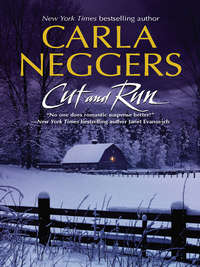
Полная версия
Cold Ridge
Gus arrived a few minutes later and shooed out all the air force guys, glowering when North winked at Carine and promised he’d see her later. Gus let Antonia stay.
Their uncle was fifty, his dark hair mostly gray now, but he was as rangy and fit as ever. In addition to outfitting and leading hiking trips into the White Mountains, he conducted workshops in mountaineering, winter camping and mountain rescue. His goal, Carine knew, was to reduce the chances that anyone would ever again die the way his brother and sister-in-law had. But they did. People died in the mountains almost every year.
He brought in more wood for the woodstove and insisted Carine sit in front of the fire and tell him and her sister everything.
She did, except for the part about Ty saying she had pretty eyes.
Gus wanted her to head back to town with him, but Antonia offered to stay with Carine in her small cabin. Their brother, a U.S. marshal in New York, called and agreed with the general assessment that the shooters hadn’t “missed” her. If they’d wanted her dead, she’d be dead. “Lay low for a few days, will you?”
Out of Antonia’s earshot, Carine asked Nate what he’d think if she dated Tyler North.
“Has he asked you out?”
“No.”
“Thank God for small favors.”
The next day, Ty and his friends ended up rescuing a Massachusetts couple who got trapped on Cold Ridge. Sterling and Jodie Rancourt had recently bought a house off the notch road and set out on their first hike on the ridge, for what they’d intended to be a simple afternoon excursion. Instead, they encountered higher winds, colder temperatures and rougher terrain than they’d anticipated. Ty, Hank and Manny, prepared for the conditions, helped transport them below the treeline, where they were met by a local volunteer rescue team.
Jodie Rancourt had sprained her ankle, and both she and her husband were in the early stages of hypothermia, in danger of spending the night on the ridge. Given their lack of experience and the harsh conditions, they could easily have died if the three air force guys hadn’t come along when they had.
An eventful weekend in the White Mountains.
After Manny went back to his air force base and Hank to his senate campaign, Ty and Carine were alone on their quiet road in the shadows of Cold Ridge.
Gus sensed what was happening and stopped by to tell Carine she’d be out of her damn mind to get involved with Tyler North.
She didn’t listen.
Her uncle’s warning was too late. Way too late. She was in love.
She and Ty set their wedding date for Valentine’s Day.
A week before she was to walk down the aisle, he showed up at her cabin and called it off.
He couldn’t go through with it.
Enter Tyler North into her life.
Exit Tyler North.
As quick as that.
One
For the first time in weeks, Carine didn’t spend her lunch hour thinking about photographing wild turkeys in the meadow outside her log cabin in Cold Ridge. She wandered through Boston Public Garden, eating the tuna sandwich she’d made and packed that morning. Every dime was critical to her ability to afford both her cabin in New Hampshire and her apartment in the city. Not that it was much of an apartment. Not that she could ever live in her cabin again.
The last of the leaves, even in Boston, had changed color, and many had fallen to the ground, a temptation on a sunny, mild November afternoon. Carine remembered raking huge piles of leaves as a kid with her brother and sister—and Tyler North—and diving into them, hiding, wrestling.
Ty almost suffocated her once. Unfortunately, she hadn’t thought of it as a premonition. It was just Ty being Ty, pushing the limits.
But the nine months since their canceled wedding had taught her not to dwell on thoughts of her one-time fiancé and what might have been. She dashed across busy Arlington Street to a French café, splurging on a latte that she took back outside with her. Of course, it was true that she could be photographing wild turkeys in Cold Ridge—or red-tailed hawks, mountain sunsets, waterfalls, rock formations, alpine grasses. She was still a nature photographer, never mind that she’d been in Boston for six months and had just accepted a long-term assignment photographing house renovations.
Not just any house renovations, she thought. Sterling and Jodie Rancourt had hired her to photograph the painstaking restoration and renovation of their historic Victorian mansion on Commonwealth Avenue.
Carine sighed, sipping her latte as she peered in the display windows of the upscale shops and salons on trendy Newbury Street. But Ty kept creeping into her thoughts. Even when she’d chased him with a rake at six, spitting bits of leaves out of her mouth, she’d known not to get involved with him, ever. The six-year-old inside her, who knew better than to trust anything he said, must have been screaming bloody murder when she’d fallen in love with him last winter.
The man could jump out of a helicopter to rescue a downed aircrew—it didn’t matter where. Behind enemy lines, on a mountaintop, in a desert or a jungle or an ocean, in snow or heat or rain. In combat or peacetime. He had a job to do. Getting cold feet wasn’t an option.
Not so when it’d come to marrying her.
Carine hadn’t spoken to him since he’d knocked on her cabin door and said he couldn’t go through with their wedding. He’d disappeared into the mountains for a few days of solo winter camping, lived through it, then returned to his base. She’d heard he’d been deployed overseas and participated in dangerous combat search and rescues. CSARs. He’d also performed humanitarian missions, one to treat injured women and children in an isolated area. Carine appreciated the work he did, and gradually, her anger at him had worn off, along with her shock. They were easy emotions to deal with in comparison to the hurt and embarrassment that had followed him walking out on her, the palpable grief of losing a man she’d come to regard in those few short months, maybe over her lifetime, as her soul mate.
Even when he was away, there were reminders of him everywhere in Cold Ridge. And, of course, when he was on leave, when he could get away for a couple of days, he was there.
By early summer, Carine knew she had to pick up the pieces of her life and make some changes, explore new options, expand her horizons—not that it always felt that way. Sometimes, even now, it felt as if she were still licking her wounds, still running from herself and the life she wanted to lead.
But not today—today was a gorgeous late autumn day, perfect for not thinking about Cold Ridge and Tyler North. As far as she was concerned, he was back to being the thorn in her side he’d always been. She’d trust him with her life—who wouldn’t? But she’d never again make the mistake of trusting him with her heart.
That was what Gus had tried to tell her after the shooting incident in the woods last November. “You can trust him with your life, Carine, but—damn it, he’ll break your heart in the end.”
She’d thought her uncle was just worrying about her. People tended to worry about her. She wasn’t a tough U.S. marshal like her brother or a physician who’d seen everything like her sister—people saw her as the sensitive soul of her family, a nature photographer who’d never really left home.
Well, now she had.
She finished her latte and decided to head back to Commonwealth Avenue and the Rancourt house, although she wasn’t under any time constraints. The Rancourts hadn’t just hired her out of the blue. They weren’t part of her horizon-expanding. They’d hired her, Carine knew, because she was from Cold Ridge, friends with the three men who rescued them the year before. Hank Callahan and Antonia had started dating in Boston after that first meeting in Carine’s cabin. He was now her brother-in-law. As of a week ago, the voters of the Commonwealth of Massachusetts had made him their junior senator-elect. Since he was friends with Ty and Antonia was a fiercely loyal sister, their relationship had suffered after Carine’s aborted wedding. Then Antonia found herself trapped on an island off Cape Cod with a violent stalker and with a hurricane about to blow on shore; Hank had come after her, ending any doubts either of them had. The media—and voters—lapped up the story. But it was clear to everyone that Hank hadn’t been thinking about their opinion when he’d headed to the Shelter Island.
No, Carine thought, she had no illusions. As much as she liked them, Sterling and Jodie Rancourt had their own reasons for asking her to do the job.
She walked slowly, in no hurry. Her hair was pulled back neatly, and she wore jeans, a black turtleneck, her barn coat and waterproof ankle boots, comfortable clothes that permitted her to go up and down ladders, trek over drop cloths and stacks of building supplies and tools, do whatever she had to do to get the particular picture she wanted. She was used to climbing mountains and edging across rock ledges to get the right light, the right color, the right composition. Negotiating house renovations didn’t seem that daunting to her. It had been a quiet morning—she hadn’t even taken her camera out of its bag and had left it at the Rancourt house while she was at lunch. She was using her digital camera today, at Jodie Rancourt’s request—Jodie wanted to get a better idea of the technical differences between digital and film.
A shiny black sports car pulled alongside her, and Louis Sanborn, also newly employed by the Rancourts, rolled down his window and flashed his killer smile at her. “Hey, Ms. Photographer, need a ride over to the big house?”
Carine laughed. “Thanks for the offer, Mr. Security Man.” Louis was tall and, despite his prematurely gray, scrub-brush hair, younger than he looked, probably just a year or two older than she was. The Rancourts had hired him two weeks ago as the assistant to their chief of security. “I don’t mind walking. We won’t get many more days like today. It’s beautiful out.”
“Only according to you granite-head types.”
“It’s in the fifties!”
“That’s what I’m saying. Having a good lunch hour?”
“An excellent lunch hour.”
“Me, too. See you over on Comm. Ave.”
His car merged back into the Newbury Street traffic. Carine continued on up to Exeter Street, then cut down it to Commonwealth Avenue. With its center mall and stately Victorian buildings, it was the quintessential street of Boston’s Back Bay, all of which was on reclaimed land that used to be under water—hence its name.
Still in no hurry, she sat on a bench on the mall, famous for its early springtime pink magnolias, now long gone. A toddler ran after a flutter of pigeons, and Carine tried not to think about the babies she’d meant to have with Ty, but, nonetheless, felt a momentary pang of regret. The toddler’s mother scooped him up and swung him in the brisk November air, then set him back in his stroller. He was ticked off and started to kick and scream. He wanted to chase more pigeons. Two months ago—a month ago—the scene would have made Carine cry, but now she smiled. Progress, she thought.
She walked across the westbound lane to the historic brick-front mansion the Rancourts had snapped up when it came onto the market eighteen months ago. It was a rare find. Its longtime owner, now dead, had never carved it up into apartments, in fact, had done few renovations—many of the house’s original features were still intact. Hardwood floors, ornate moldings, marble fireplaces, chandeliers, wainscoting, fixtures. It had taken most of the past eighteen months for the team of architects, preservationists, designers and contractors just to come up with the right plans for what to do.
Carine’s job photographing the renovations could easily take her through the winter, while still leaving room for her to pursue other projects. She’d been at it for six weeks. Work would happen in a frenzy for a few days, the place crawling with people. Then everyone would vanish, and nothing would happen for a morning, an afternoon, even a week. That left her with spurts of time she could put to use doing something more productive than drinking lattes and window shopping.
She noticed Louis Sanborn’s car parked out front and smiled, shaking her head. Leave Louis to find a convenient parking space—she never could, and almost always walked or took public transportation in the city.
Since she’d left for lunch, someone had set out a pot of yellow mums on the front stoop; the wrought-iron rail was cool to the touch as she mounted the steps to the massive dark wood door. It was open a crack, and she pushed it with her shoulder and went in, immediately tossing her latte cup into an ugly green plastic trash bin just inside the door. Sweeping, graceful stairs rose up to the second floor of the five-story house. She’d never been in any place like it. Not one inch of it reminded her of her little log cabin with its rustic ladder up to the loft.
“Hello?” she called. “Anyone here?”
Her footsteps echoed on the age-darkened cherry floor of the center hall. To her left was a formal drawing room with a marble fireplace and a crystal chandelier, then a smaller room and the library. There was even an elegant ballroom on the second floor. The Rancourts had promised to invite Carine the first time they used it, teasing her that they wanted to see her in sequins.
She retrieved her camera from a cold, old-fashioned radiator in the hall. There had to be someone around. Nobody would leave the door open with the place empty.
“Louis? Are you here? It’s me, Carine.”
He could be upstairs, she thought, slinging her camera bag over her shoulder. She’d assumed workers would be in this afternoon, but she didn’t keep close track of their comings and goings. As she turned to head back to the front entry, something caught her eye in the library. She wasn’t sure what—something out of place. Wrong.
She took a shallow breath, and it was as if a force stronger than she was compelled her to take a step forward and peer through the double doorway. Restoration work hadn’t started yet in the library. Intense discussions were still under way over whether it was worth the expense to have its yellowed wallpaper, possibly original to the house, copied.
Carine touched the wood molding, telling herself she must have simply seen a shadow or a stray drop cloth. Then she jumped back, inhaling sharply, even as her mind struggled to take in what she was seeing—a man facedown on the wood floor. Louis. She recognized his dark suit, his scrub-brush hair. She lunged forward, but stopped abruptly, almost instinctively.
A pool of something dark, a liquid, oozed toward her. She stood motionless, refusing to absorb what she was seeing.
Blood.
It seeped into the cracks in the narrow-board floor. It covered Louis’s outstretched hand.
Help…
She couldn’t speak. Her mouth opened, but no sound came out.
His hair…his hand…in the blood…
“Oh, God, oh, God—Louis!” Carine leaped forward, yelling back over her shoulder. “Help! Help, someone’s hurt!”
She avoided stepping in the blood. It wasn’t easy—there was so much of it. Louis…he can’t be dead. I just saw him!
She had only rudimentary first aid skills. She wasn’t an ER doctor like her sister or a highly trained combat paramedic like North and Manny Carrera. But they weren’t here, and she forced herself to kneel beside Louis Sanborn and control her horror and fear as she touched two fingers to his carotid artery. That was it, wasn’t it? Arteries beat with the heart. Veins didn’t. To see if he had a pulse, she had to find an artery.
There was no pulse, not with that much blood.
“Louis. Oh, God.”
She looked around the empty room, her voice echoing as she yelled again for help. Had he fallen and landed on a sharp object—a stray chisel or a saw, or something? The back of his suit was unmarred. No blood, no torn fabric. Whatever injury he had must have been in front. But she didn’t dare turn him over, touch him further.
She rose shakily. No one had come in answer to her yells for help. Louis Sanborn was dead. She was alone. She absorbed the reality of her situation in short bursts of awareness, as if she couldn’t take it all in at once.
Hey, Ms. Photographer, need a ride over to the big house?
What if she’d said yes? Could she have saved his life? Or would she be dead, too?
How had he died?
What if it wasn’t an accident?
It wasn’t. She knew it wasn’t.
She ran into the hall, her camera bag bouncing on her hip. Where was her cell phone? She needed to call the police, an ambulance. She dug in the pocket of her barn coat, finding her phone, but she couldn’t hang on to it and dropped it on the hardwood floor, startling herself. She scooped it up, hardly pausing as she came to the front hall.
The front door stood wide open. She thought she’d shut it when she got back from lunch. Was someone else here?
She could feel the cool November air.
“Help!”
She looked down at her cell phone, realized it wasn’t on. She hit the Power button and ran onto the front stoop, knocking over the pot of mums, hoping someone on the street would hear her. She charged down the steps to the wide sidewalk. She’d call the police, stop a passing car.
Suddenly Manny Carrera was there, as if she’d conjured him up herself. He’d danced with her at Hank and Antonia’s wedding a month ago and cheerfully offered to cut off Ty’s balls the next time he saw him.
“It’s Louis…he…” She couldn’t get out the words. “He’s—oh, God—”
Manny swept her into his embrace. “I know,” he said. “I know.”
Two
Tyler North pulled two beers out of his refrigerator and brought them to the long pine table where his mother used to sit in front of the fire with her paints. Gus Winter was in her spot now, lean, scarred and irritable—and tired, although he’d never admit to it. He took one of the beers and shook his head in disgust. “You always have to allow for the moron factor.”
“People make mistakes.”
Gus drank some of his beer. It had been a brutal day, but one with a happy ending. “Forgetting your sunscreen’s a mistake. These assholes didn’t bother to check the weather conditions. They didn’t take enough food or water. You saw how they were dressed—jeans and sneakers. It’s November. Any goddamn thing can happen on the ridge in November. They’re lucky to be alive.”
No one knew better than Gus Winter that what he said was true. Ty didn’t argue with him. He sat with his beer and stared at the fire in the old center-chimney stone fireplace. Three seventeen-year-old boys from the local prep school decided to skip classes and hike the ridge trail. If they’d stayed on it, they might have been okay, but they didn’t. By early afternoon, they were cold, lost, battered by high winds and terrified of spending the night above the treeline.
“If Fish and Game determines these guys were reckless, they’ll have to cough up the bucks for the rescue,” Ty said.
“They’re complaining because we didn’t send a helicopter! Can you imagine? They figured they’d dial 911 on their cell phones if they got into trouble—”
“That’s what they did.”
Gus snorted. “Yeah. And we came. What’s with this picture? We should have waited, let them get good and scared.” He drank more of his beer. “I’m telling you, North. The moron factor.”
Ty expected the three boys they’d just rescued were the sort of hikers the New Hampshire Department of Fish and Game had in mind when they came up with their protocol for charging expenses for search and rescues in cases of out-and-out recklessness. Rescues could be difficult and dangerous—and expensive. Lucky for the boys, they hadn’t encountered moisture. Even a light rain would have soaked their cotton clothing, a poor insulator when wet. As it was, they’d suffered mild hypothermia. And intense, warranted fear for their lives.
“I did dumb-ass things at that age,” Ty said.
“You do dumb-ass things now. But do you expect people to come to your rescue?” Gus shook his head, not waiting for an answer. “Not you, North. You’ve never expected anyone to come to your rescue in your entire life, not with your mother, may she rest in peace. Lovely woman, but in her own world. It’s the arrogance of these jackasses—”
“Let it go, Gus. We did our job. The rest isn’t up to us.”
Reckless or not, the boys today weren’t the first people he or Gus had pulled off Cold Ridge. It was unlikely they’d be the last.
But Gus wasn’t willing to let it go. “Cell phones give people a false sense of security. They should be banned.”
Without a cell phone, the kids undoubtedly wouldn’t have been missed before nightfall. They’d have ended up spending the night on the ridge—a dangerous situation that might not have had a happy ending. On the other hand, without a cell phone, they might have taken fewer risks or even gone to their classes instead of sneaking off on an illicit hike. Other hikers had made the mistake of thinking their cell phones worked anywhere and didn’t discover there were gaps in coverage until they were ass-deep in trouble and had no way to call for help. Even if they did get through, help wasn’t necessarily around the damn corner.
Either way, it was North’s job to rescue people. He did it for a living in the military, and he did it as a volunteer when he was home on leave.
Gus set his beer bottle down hard on the table. “People think because the White Mountains aren’t as high as the Rockies or the Himalayas, they’re not dangerous. The reason the treeline’s lower in the northeast than it is out west is because we’ve got such shitty weather here. Three major storm tracks meet right over us—ah, hell.” He gave a grunt of disgust. “I’m preaching to the converted. You know these mountains as well as I do.”
“I’ve been away a lot.”
That was an understatement. His career as a pararescueman had taken him on search-and-rescue missions all over the world. The pararescue motto—These Things We Do That Others May Live—underscored everything he did as a PJ in both combat and peacetime. A pararescueman’s primary mission was to go after downed aircrews. Anytime, anywhere. In any kind of terrain, under permissive or hostile conditions. If there were injuries, they treated them. If they came under fire, they took up security positions and fired back.
The job required a wide range of skills. When he enlisted and decided to become a pararescueman, Ty had only a limited understanding of what it entailed. For starters, two years of training and instruction—the “pipeline.” It began with ten weeks of PJ indoctrination at Lackland Air Force Base in San Antonio. Running, swimming, calisthenics, drownproofing. Serious sleep deprivation, or at least so it seemed at the time. Of the hundred guys who showed up for indoc with him, twenty-four were still there after four weeks. He was one of them.
Then it was on to a series of specialized schools. He went through the Army Special Forces Underwater Operations Course and Navy Underwater Egress Training—navigation swims, ditching and donning of equipment underwater, underwater search patterns, getting out of a sinking aircraft. He made it through the Army Airborne School, where he had to make five static-line jumps before he could move on to freefall school, which took him through jumps at high altitude, with oxygen, at night, during the day, with and without equipment.
Fun stuff, he thought, remembering how he’d steel himself into not quitting, just sticking with it, one day—sometimes one minute—at a time.
At Air Force Survival School he learned basic survival skills, evasion-and-escape techniques, what to do if he was captured by the enemy. Then it was on to the Special Operations Combat Medic Course and, finally, to the Pararescue Recovery Specialist Course, where, over a year or more, all the previous training got put together and more was added—advance EMT-paramedic training, advance parachute skills, tactical maneuvers, weapons handling, mountain climbing and aircrew recovery procedures. They worked through various scenarios that tied in all the different skills they’d learned, seeing their practical application for the job that lay ahead.











